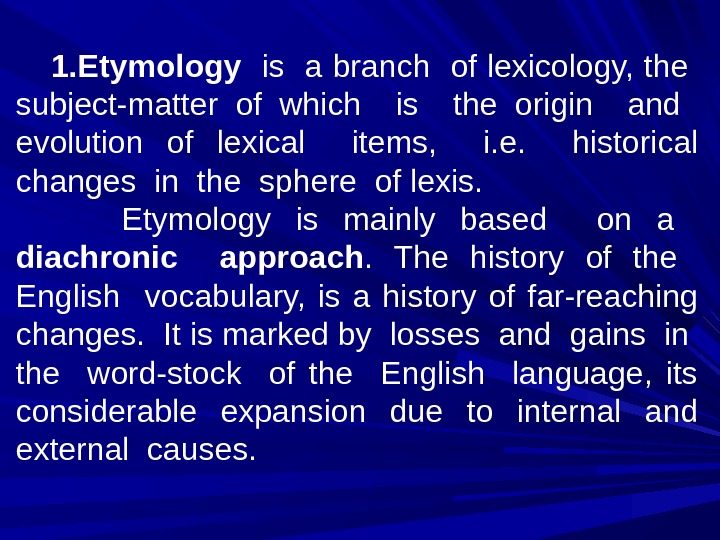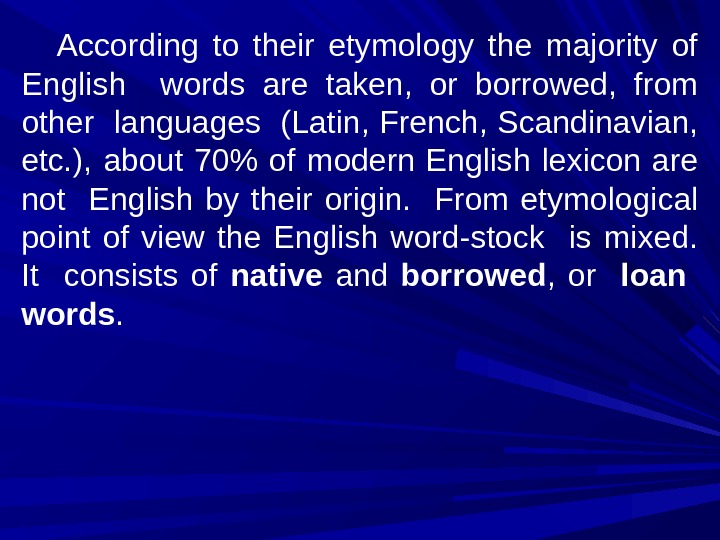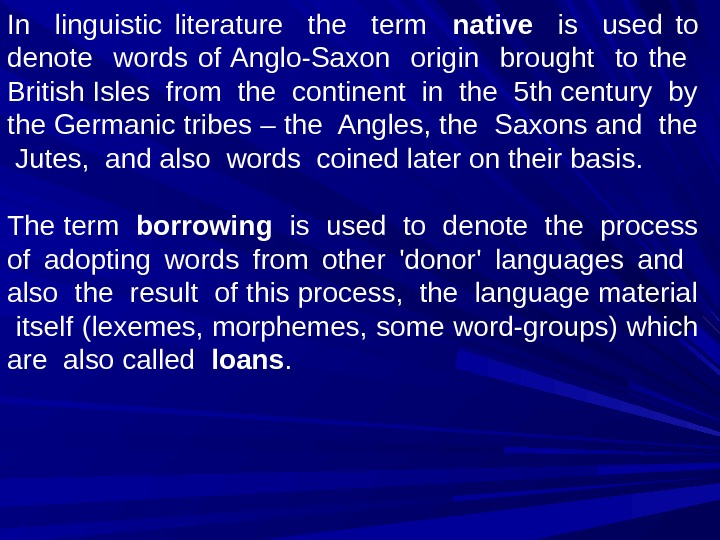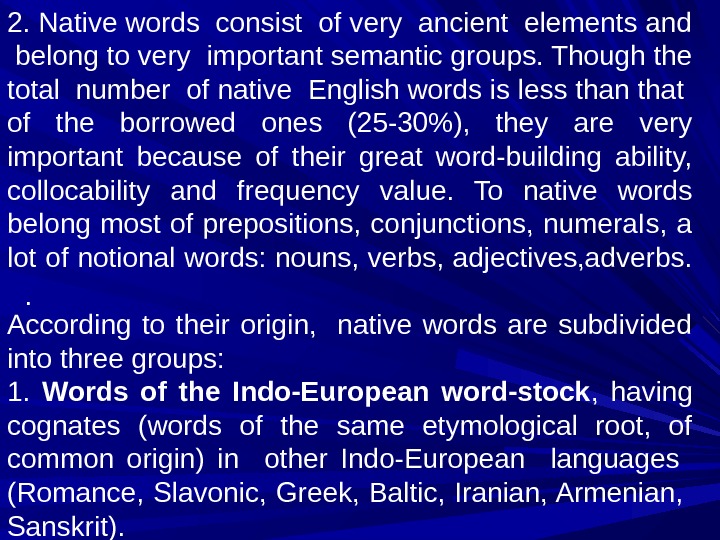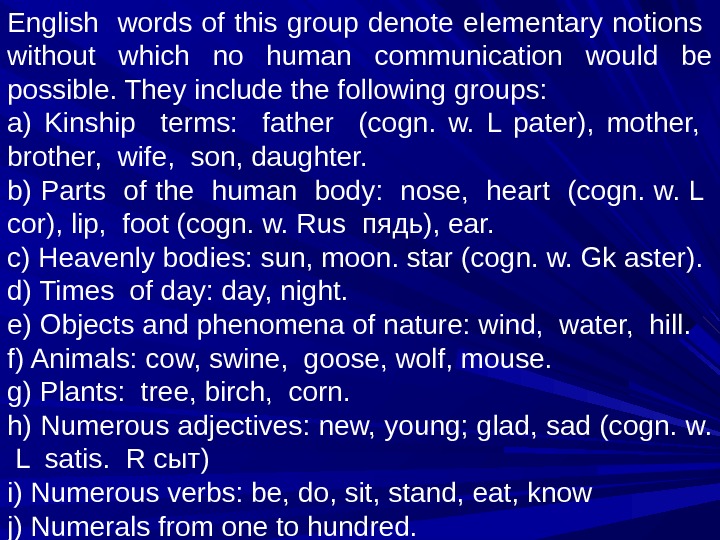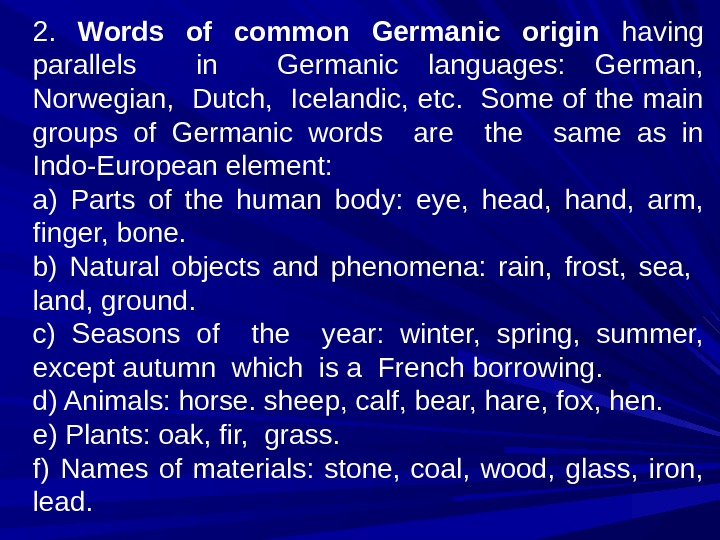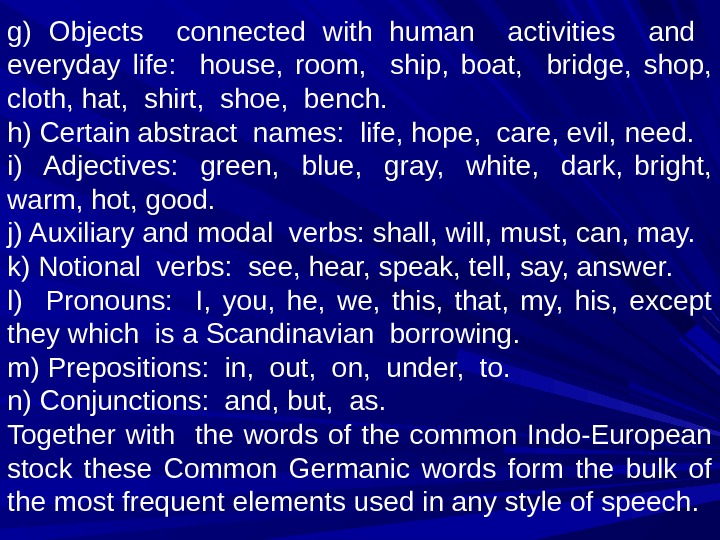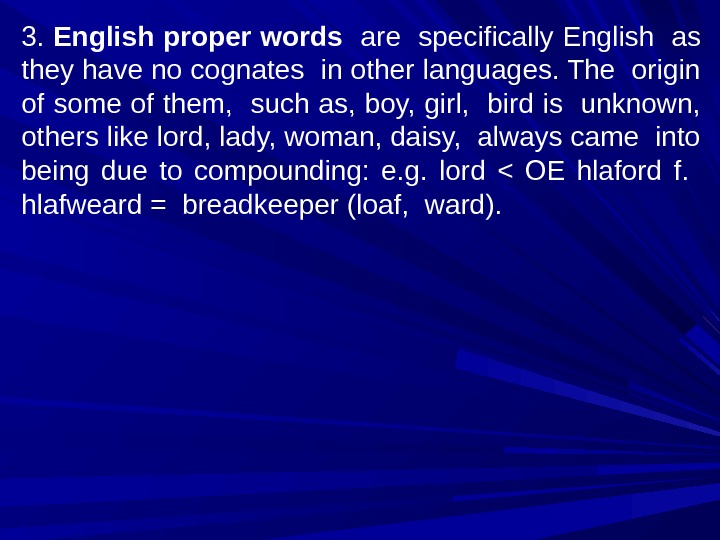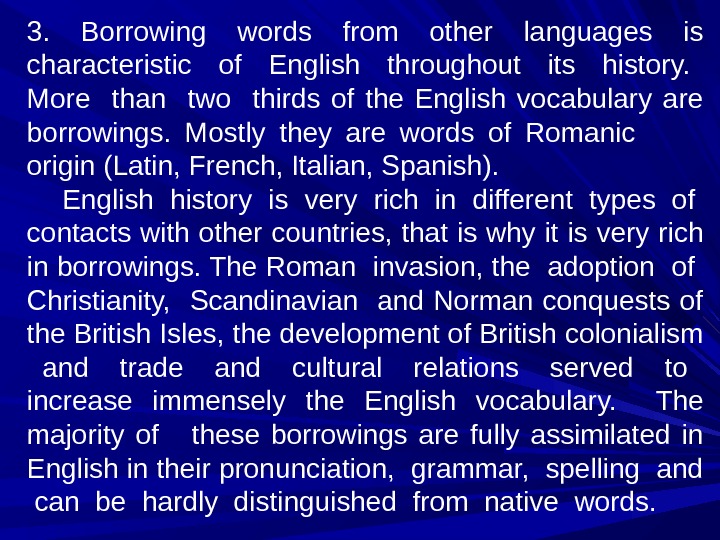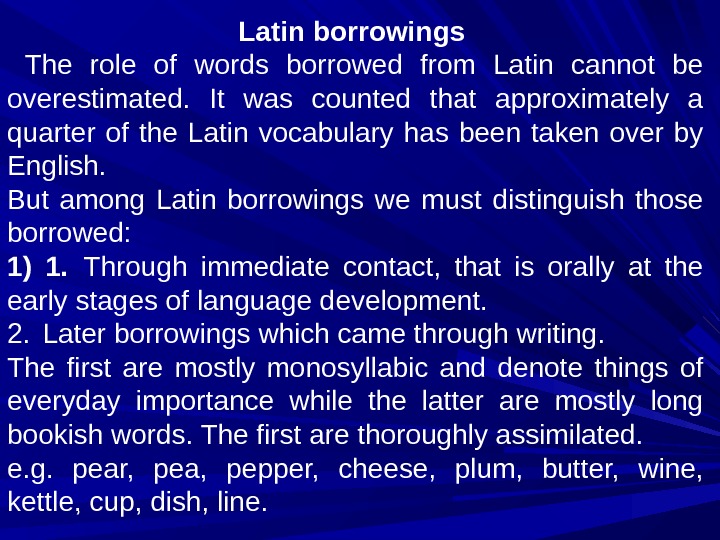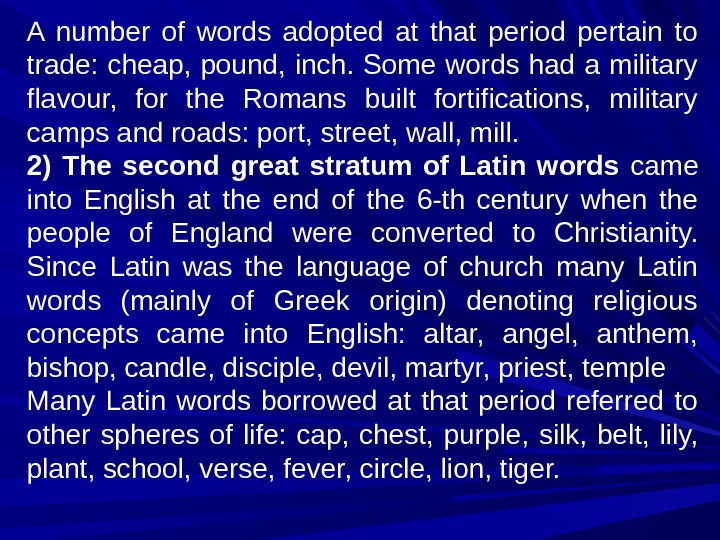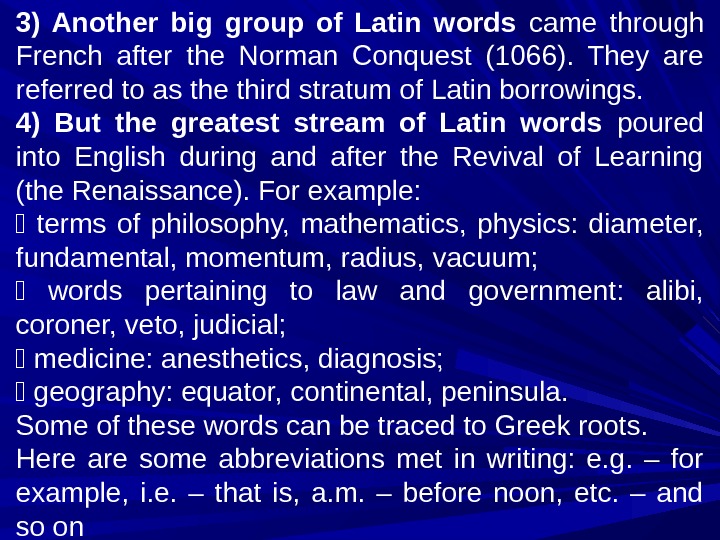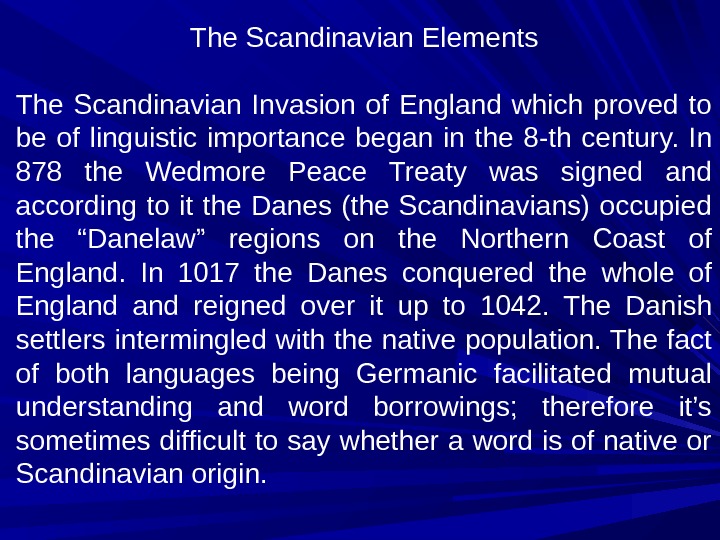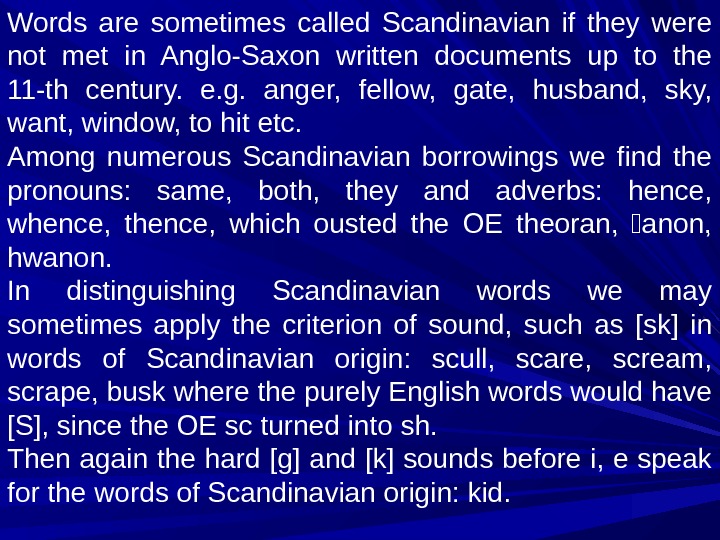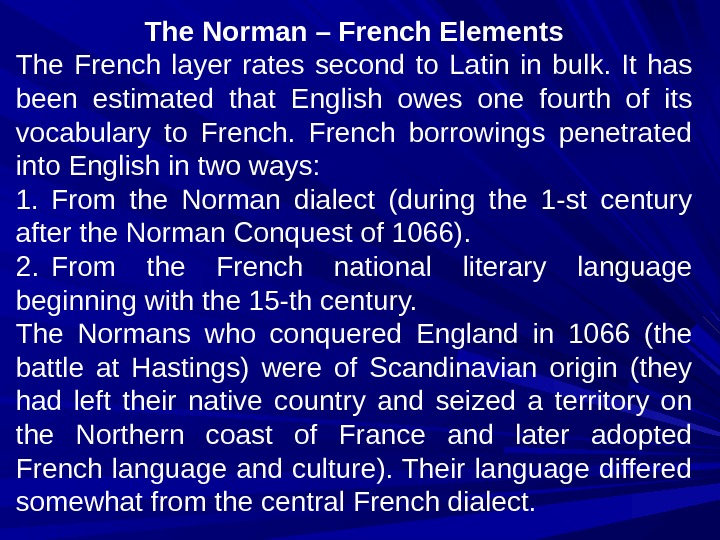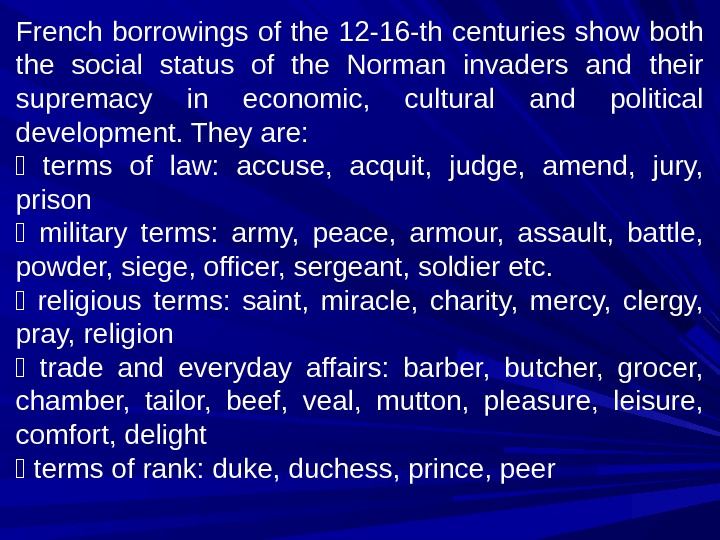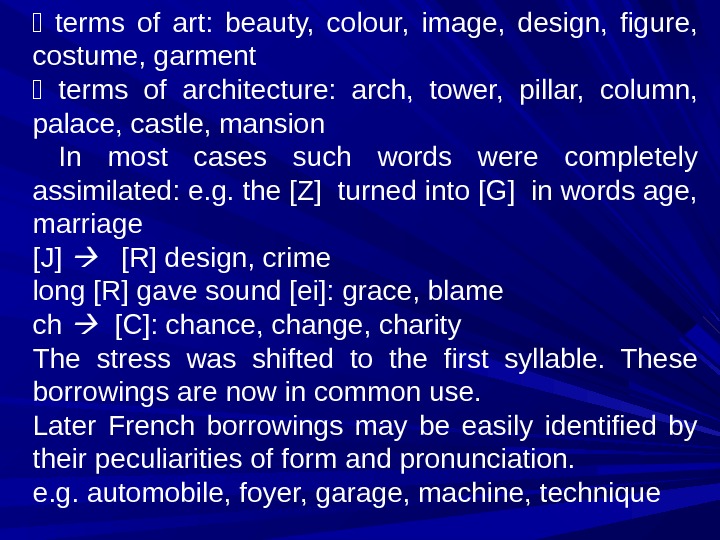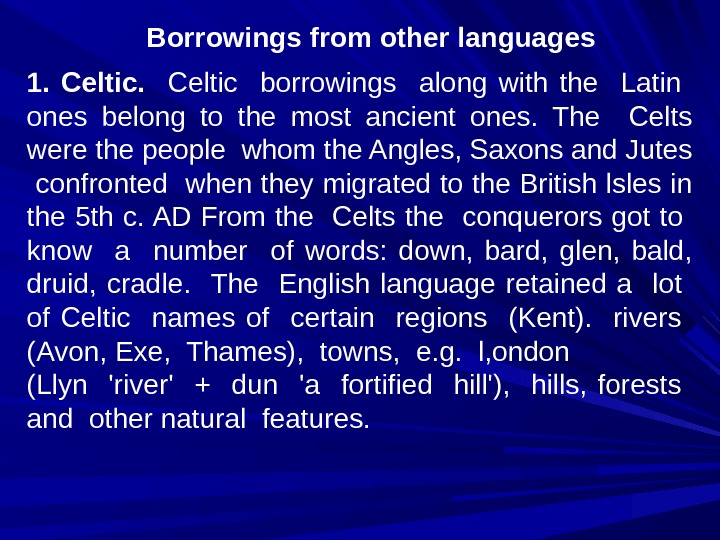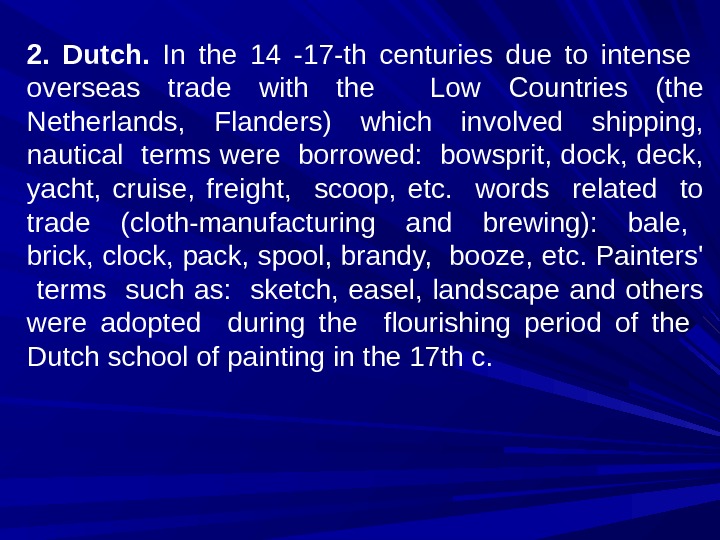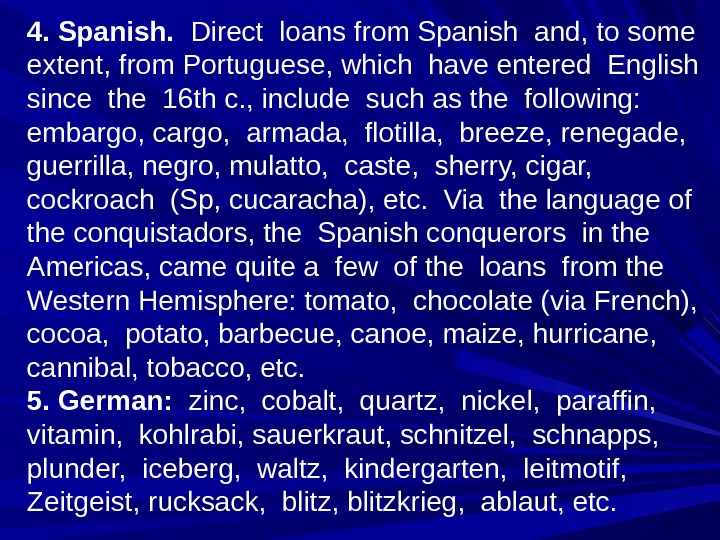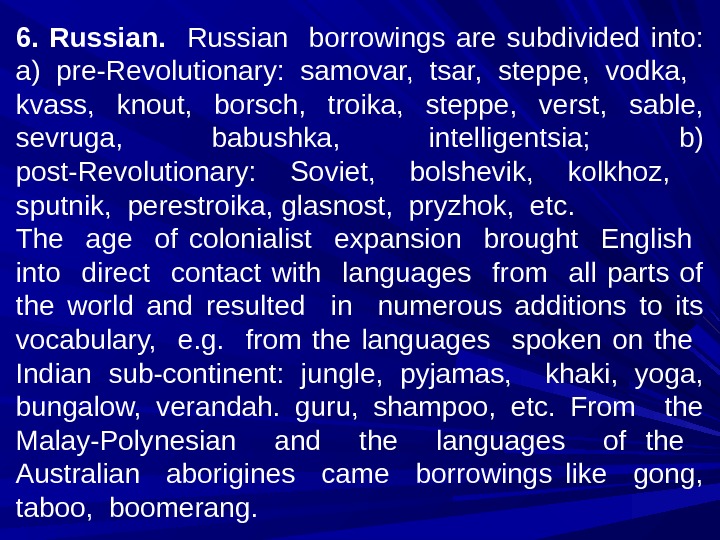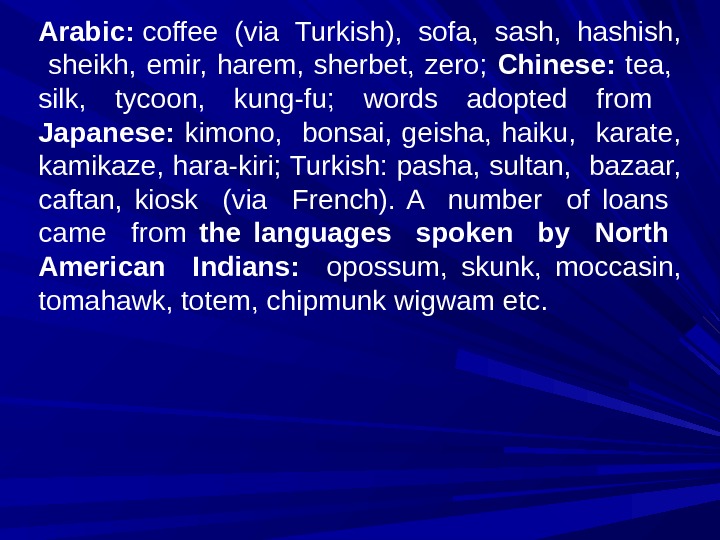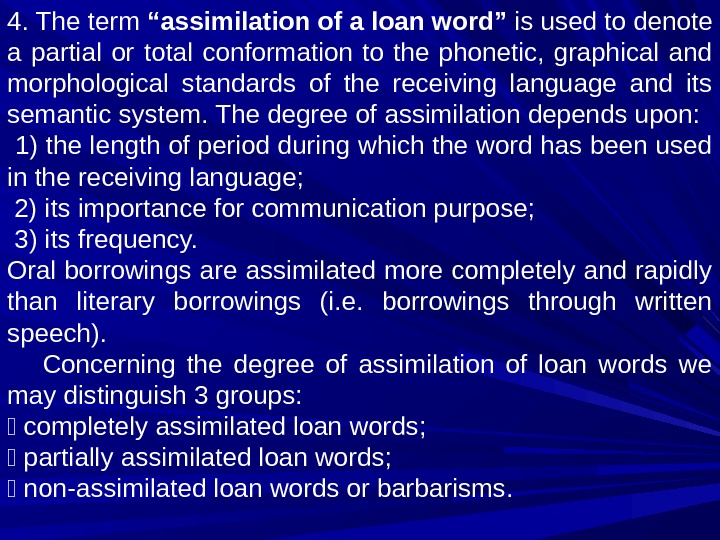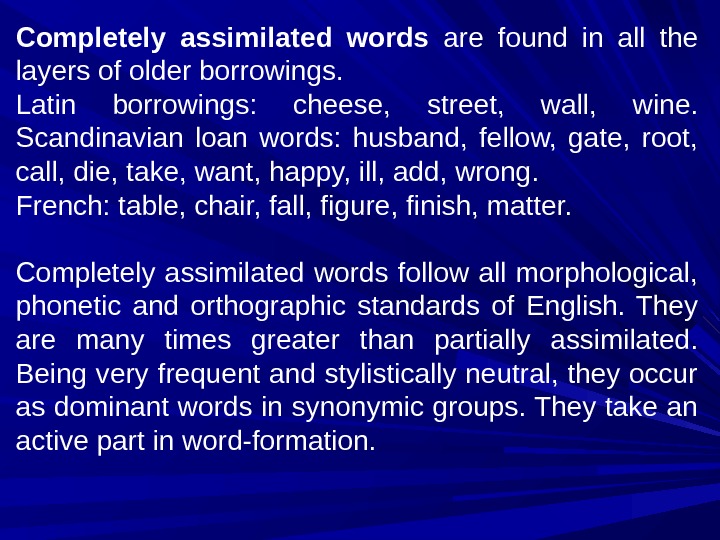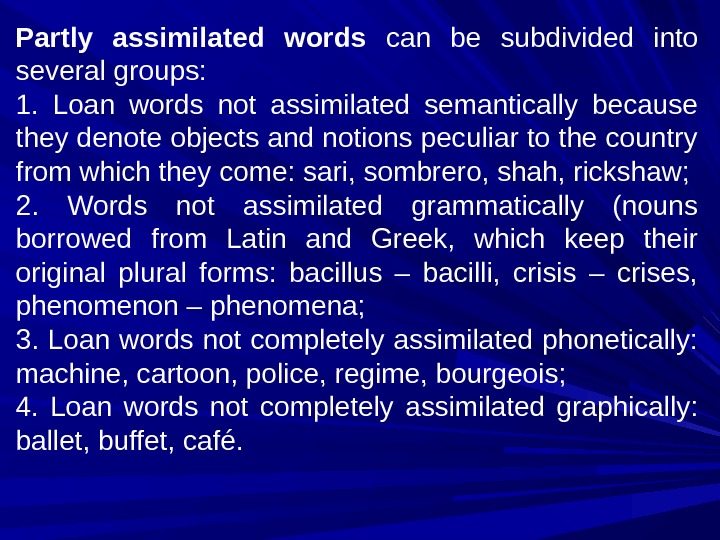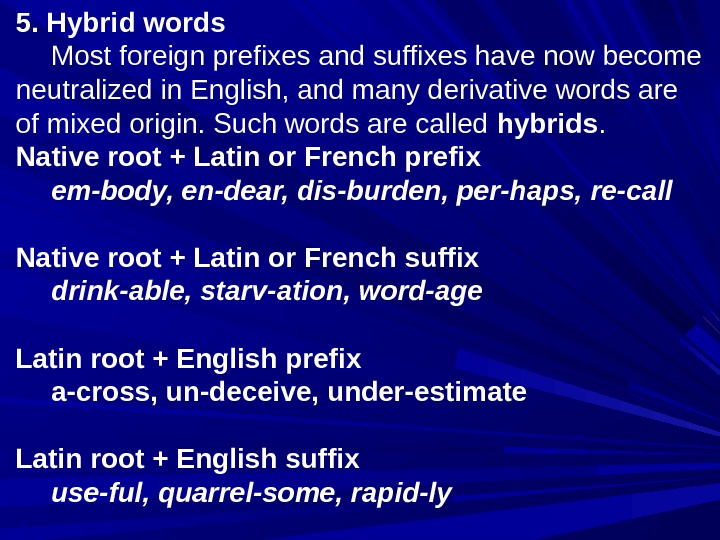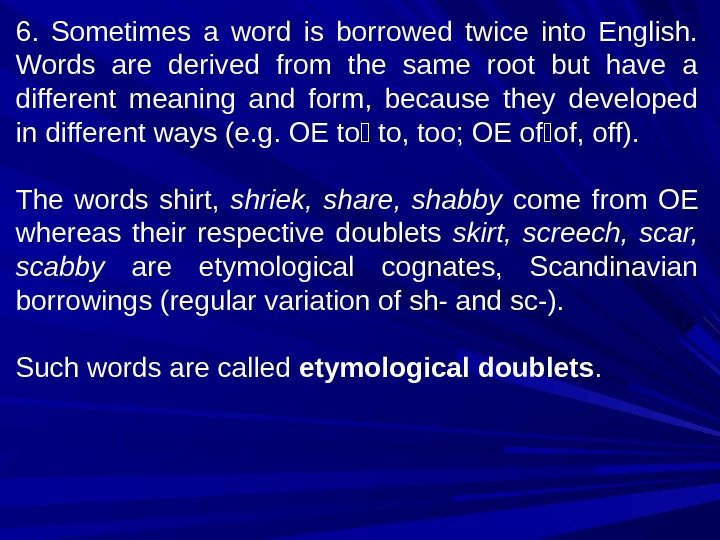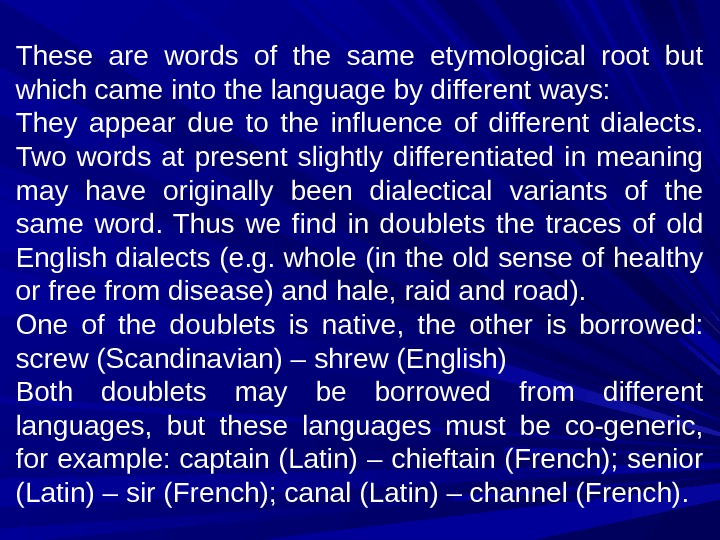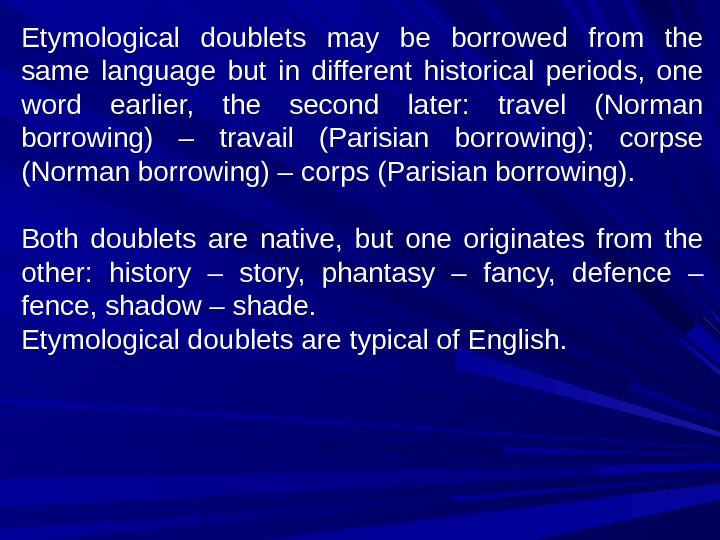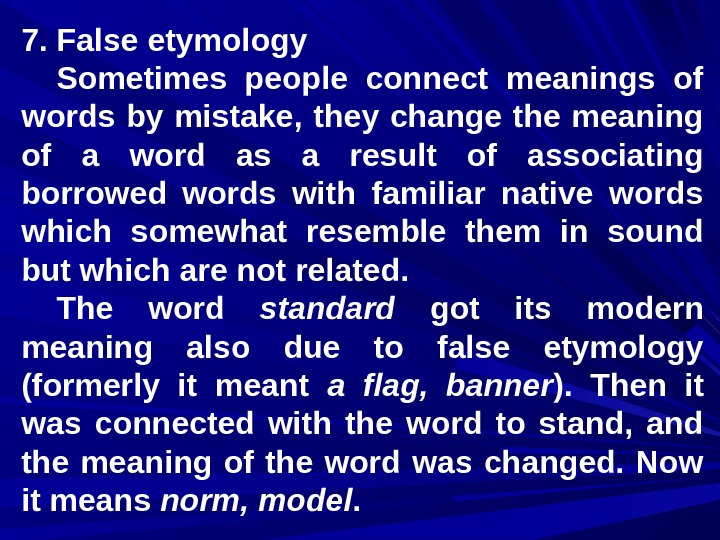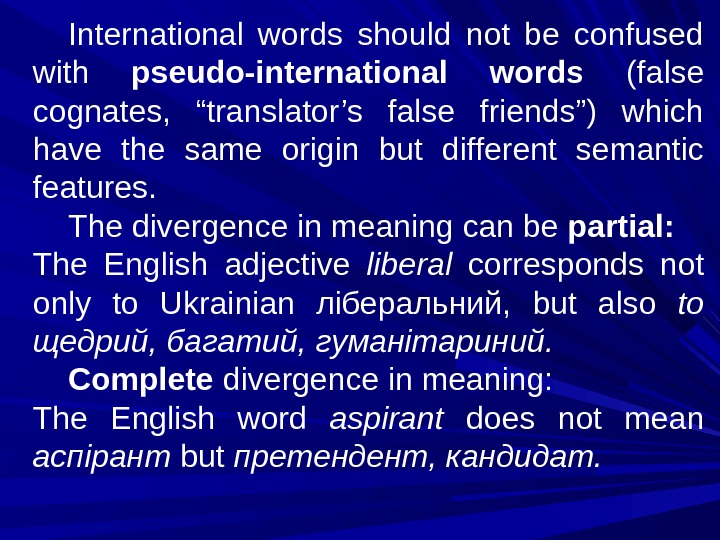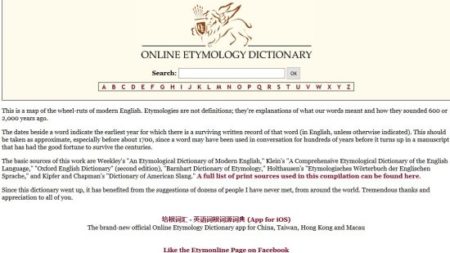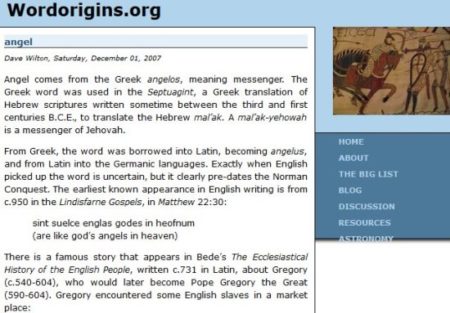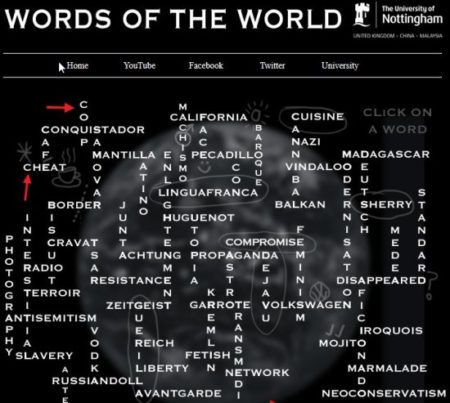2. Etymology. Etymological structure of the English Vocabulary.
1.
Etymology
is a
branch of lexicology studying the origin of words. Etymologically, the
English vocabulary is divided into native and loan words, or borrowed words.
A native word is a word which belongs to the original English word stock and
is known from the earliest available manuscripts of the Old English period. A
borrowed word is a word taken over from another language and modified
according to the standards of the English language.
2.
3.
The
etymological linguistic analysis showed that the borrowed stock of words is
larger than the native stock of words. In fact native words comprise only 30%
of the total number of words in the English vocabulary. A native word is a
word which belongs to the original English stock, which belongs to
Anglo-Saxon origin.
4.
5.
Many
linguists consider foreign influence plays the most important role in the
history of the English language. But the grammar and phonetic system are very
stable (unchangeable) and are not often influenced by other languages.
Besides when we speak about the role of native and borrowed words in the
English language we must not take into consideration only the number of them
but their semantic, stylistic character, their word building ability,
frequency value, collocability (valency) and the productivity of their word
building patterns. If we approach the study of the role of native borrowed
words from this point of view we see, though the native words are not
numerous they play an important role in the English language. They have high
frequency value, great word-forming power, wide collocability, many meanings
and they are stylistically neutral.
6.
Almost
all words of native origin belong to very important semantic groups. They
include most of the auxiliary and model verbs: shall, will, should, must,
can, may; pronouns: I, he, my, your, his, who, whose; prepositions: in, out,
on, under, for, of; numerals: one two three, four, five, six, etc;
conjunctions: and, but, till, as etc; words denoting parts of body: head,
hand, arm, back, foot, eye etc; members of a family: father, mother, brother,
son, wife; natural phenomena and planets: snow, rain, wind, sun, moon,
animals: horse, cow, sheep, cat; common actions: do, make, go, come, hear,
see, eat, speak, talk etc. All these words are very frequent words, we use
them every day in our speech. Many words of native origin possess large
clusters of derived and compound words in the present-day language.
7.
Such
affixes of native origin as er, -ness, -ish, -ed, un, -mis, -dom, -hood, -ly,
-over, -out, -under, — are of native origin.
Этимология — это ветвь лексикологии,
изучающая происхождение слов. Этимологически, английский словарь разделен на
родные и заемные слова или заимствованные слова. Родное слово — это слово,
которое принадлежит оригинальному английскому языку и известно из самых
ранних доступных рукописей древнеанглийского периода. Заимствованное слово —
это слово, взятое с другого языка и измененное в соответствии со стандартами
английского языка.
Этимологический лингвистический анализ показал, что заимствованный
запас слов больше, чем собственный запас слов. Фактически, родные слова
составляют только 30% от общего числа слов в английской лексике. Родным
словом является слово, которое принадлежит оригинальному английскому запасу,
принадлежащему англо-саксонскому происхождению.
Многие лингвисты считают, что иностранное влияние играет самую важную
роль в истории английского языка. Но грамматика и фонетическая система очень
стабильны (неизменяемы), и на них часто не влияют другие языки. Кроме того,
когда мы говорим о роли родных и заимствованных слов в английском языке, мы
не должны принимать во внимание только их число, но их семантический,
стилистический характер, их способность к построению, частотность,
способность колликации (валентность) и производительность их. Шаблоны
словообразования. Если мы подходим к изучению роли коренных заимствованных
слов с этой точки зрения, мы видим, хотя родные слова не многочисленны, они
играют важную роль на английском языке. Они имеют высокую частотную ценность,
большую словообразующую силу, широкую совместимость, много значений, и они
стилистически нейтральны.
Почти все слова родного происхождения принадлежат к очень
важным семантическим группам. Они включают большинство вспомогательных и
модельных глаголов: они должны, должны, должны, должны, могут; Местоимения:
Я, он, мой, ваш, его, кто, чей; Предлоги: in, out, on, under, for, of; Цифры:
одна два три, четыре, пять, шесть и т. Д .; Союзы: и, но, до, как и т. Д .;
Слова, обозначающие части тела: голова, рука, рука, спина, стопа, глаз и т. Д
.; Члены семьи: отец, мать, брат, сын, жена; Природные явления и планеты:
снег, дождь, ветер, солнце, луна, животные: лошадь, корова, овца, кошка; Общие
действия: делать, делать, идти, приходить, слышать, видеть, есть, говорить,
говорить и т. Д. Все эти слова — очень частые слова, мы используем их каждый
день в нашей речи. Многие слова родного происхождения обладают большими
кластерами производных и сложных слов на современном языке.
Такие аффиксы родного происхождения, как er, -ness, -ish, -ed, un,
-mis, -dom, -hood, -ly, -over, -out, -under, — имеют коренное происхождение.
1.Etymological structure of the English vocabulary.
2 Native word-stems (man, pan).
3. Borrowings from latin (fanaticus — fan).
4. Scandinavian borrowings (sky) – 9th-10th century.
5. Borrowings from French (beggar, fiancé) -Norman Conquest, 11th
century.
6.Borrowings from other languages (European, Oriental — feng shui,
American Indians).
1.Этимологическая структура английской
лексики.
2 Родные словосочетания (человек, кастрюля).
3. Заимствования из латинского (fanaticus — fan).
4. Скандинавские заимствования (небо) — 9-10
в.
5. Заимствования с французского (нищий,
жених) во время завоевания Нормана, 11 век.
6.Заимствования с других языков (европейские,
восточные — фэн-шуй, американские индейцев)
1.
Words of native origin
The origin of English words.
The most characteristic feature of English is its mixed
character. While it is wrong to speak of the mixed character of the language
as a whole, the composite nature of the English vocabulary cannot be denied.
1.
Native
words — words of Anglo-Saxon origin brought to the British Isles from the
continent in the 5th century by the Germanic tribes — the Angles, the Saxons
and the Jutes.
2.
Native words are subdivided into two groups:
1) words of the Common Indo-European word stock
2) words of the Common Germanic origin
3.Words of the Indo-European stock have cognates (parallels) in
different Indo-European languages: Greek, Latin, French, Italian, Polish,
Russian and others: father (OE fder, Gothic fadar, Swedish fader,
German Vater, Greek patйr, Latin pбter, French pere, Persian pedжr, Sanscrit pitr)
4.Words
of the Common Germanic stock have cognates only in the Germanic group: in
German, Norwegian, Dutch, Icelandic, etc.: to sing (OE singan, Gothic
siggwan, German singen)
5. Numerically the Germanic group is larger. Thematically these
two groups do not differ very much. Words of both groups denote parts of the
human body, animals, plants, phenomena of nature, physical properties, basic
actions, etc. Terms of kinship, the most frequent verbs and the majority of
numerals belong to the Common Indo-European word stock. Many adverbs and
pronouns are of Germanic origin.
6.Native words constitute about 30 percent of the English
vocabulary, but they make up 80 percent of the 500 most frequent words.
Almost all native words belong to very important semantic groups. They
include most of the auxiliary and modal verbs (shall, will, should, would,
must, can, may), pronouns (I, you, he, my, your, his, who, whose),
prepositions (in, out, on, under), numerals (one, two, three, four, etc),
conjunctions (and, but, till, as), articles.
7.Besides high frequency value words of the native word stock
are characterised by the following features:
— simple structure (they are often monosyllabic)
— developed polysemy
— great word-building power
— an ability to enter a great number of phraseological units
— a wide range of lexical and grammatical valency
— stability
8.Notional words of Anglo-Saxon origin:
— parts of the body: head, hand, arm, back;
— members of the family and closest relatives: father, mother,
brother, son, wife;
— natural phenomena and planets: snow, rain, wind, frost, sun,
moon, star;
— animals: horse, cow, sheep, cat;
— qualities and properties: old, young, cold, hot, heavy, light,
dark, white, long;
— common actions: do, make, go, come, see, hear, eat.
Native words are highly polysemantic, stylistically neutral,
enter a number of phraseological units. We see that the role
of native words in the language is great. Many authors use native words more
than foreign ones. Thus Shakespeare used 90% native words and 10% foreign
words. Swift used 75% native words.
1. Слова родного происхождения
Происхождение английских слов.
Наиболее характерной чертой английского
является его смешанный характер. Хотя ошибочно говорить о смешанном характере
языка в целом, несоответствующий характер английского словаря нельзя
отрицать.
1. Родные слова — слова англосаксонского
происхождения, привезенные на Британские острова с континента в 5 веке
германскими племенами — англами, саксами и ютами.
2.Родные слова подразделяются на две группы:
1) слова общего индоевропейского словарного
запаса
2) слова общего германского происхождения
3.Слова индоевропейского фонда имеют родственные (параллели) в разных
индоевропейских языках: греческий, латинский, французский, итальянский,
польский, русский и другие: отец (СА f fder, готический
фадар, шведский фейдер, немецкий фатер, греческий Patrr,
латинский pbter, французский pere,
персидский педжр, Sanscrit pitr)
4.Слова общегерманского происхождения имеют
родственные отношения только в германской группе: на немецком, норвежском,
голландском, исландском и т. д .: петь (СА singan,
готический сиггван, немецкий singen)
5.Численно германская группа больше.
Тематически эти две группы не очень сильно отличаются. Слова обеих групп
обозначают части человеческого тела, животных, растений, явления природы,
физические свойства, основные действия и т. Д. Сроки родства, самые частые
глаголы и большинство цифр относятся к общему индоевропейскому слову. Многие
наречия и местоимения имеют германское происхождение.
6.Родные слова составляют около 30 процентов
английской лексики, но они составляют 80 процентов из 500 наиболее часто
встречающихся слов. Почти все родные слова принадлежат к очень важным
семантическим группам. Они включают в себя большинство вспомогательных и
модальных глаголов (должно, должно, должно, должно, должно быть, может),
местоимения (я, вы, он, мой, ваш, его, кто, чей), предлоги (в, На, внизу),
цифры (один, два, три, четыре и т. Д.), Союзы (и, но, до, как), артикли.
7.Помимо высокочастотных значений слова
исходного словарного запаса характеризуются следующими особенностями:
— простая структура (они часто односложные)
— развитая полисемия
— отличная сила слова
— способность вводить большое количество
фразеологических единиц
— широкий диапазон лексической и
грамматической валентности
— стабильность
8.Условные слова англосаксонского
происхождения:
— части тела: голова, рука, рука, спина;
— члены семьи и ближайшие родственники: отец,
мать, брат, сын, жена;
— природные явления и планеты: снег, дождь,
ветер, мороз, солнце, луна, звезда;
— животные: лошадь, корова, овца, кошка;
— качества и свойства: старые, молодые,
холодные, горячие, тяжелые, светлые, темные, белые, длинные;
— общие действия: делать, делать, идти,
приезжать, видеть, слышать, есть.
Родные слова очень многозначны,
стилистически нейтральны, входят в число фразеологических единиц. Мы видим, что роль родных слов в языке велика. Многие авторы
используют родные слова больше, чем иностранные. Таким образом, Shekespear
использовал 90% родных слов и 10% иностранных слов. Swift использовал 75%
родных слов.
Borrowings enter the language in two ways: though oral
speech (by immediate contact between the people) and though written speech
(by indirect contact though books). Words borrowed orally (inch, mill,
street, map) are usually short and they undergo more change in the act of
adopter. Written borrowings (communique, belles — letters naivete,
psychology, pagoda etc) are often rather long and they are unknown to many
people, speaking English
Заимствования входят в язык двумя способами:
через устную речь (непосредственным контактом между людьми) и через
письменную речь (косвенным контактом, через книги). Слова, заимствованные
устно (дюймы, мельница, улица, карта), обычно коротки, и они подвергаются
большему изменению в акте усыновителя. Письменные заимствования (коммуна,
стиль переписки беллас — письма , психология, пагода и т. Д.) Часто довольно
длинные, и они неизвестны многим людям, говорящим по-английски
Borrowed words have been called “the milestones of
philology” — said O. Jeperson — because they permit us (show us ) to fix approximately
the dates of linguistic changes. They show us the course of civilization and
give us information of the nations”.
Заимствованные слова были названы «вехами
филологии», — сказал О. Джеперсон, — потому что они позволяют нам (показать)
приблизить даты лингвистических изменений. Они показывают нам курс
цивилизации и дают нам информацию о народах ».
The well-known linguist Shuchard said “No language is entirely
pure”, that all the languages are mixed. Borrowed words enter the language as
a result of influence of two main causes or factors; linguistic and
extra-linguistic. Economic, cultural, industrial, political relations of speakers
of the language with other countries refer to extra-linguistic factors. The
historical development of England also influenced the language. Due to the
great influence of the Roman civilization Latin was for a long time used in
England as the language of learning and religion. Old Norse of the
Scandinavian tribes was the language of the conquerors (9th, 10th and 11th
centuries). French (Norman dialect) was the language of the other conquerors
who brought with them a lot new notions of a higher social system, developed
fuedalizm. It was the language of upper classes, of official documents and
school (11th-14th centuries). These factors are
extra-linguistic ones.
Известный лингвист Шухард сказал: «Нет языка
в чистоте», что все языки смешаны. Заимствованные слова входят в язык в
результате влияния двух основных причин или факторов; Лингвистической и
внеязыковой. Экономические, культурные, промышленные, политические отношения
носителей языка с другими странами относятся к экстралингвистическим
факторам. Историческое развитие Англии также повлияло на язык. Из-за большого
влияния римской цивилизации латынь долгое время использовалась в Англии как
язык обучения и религии. Древнескандинавские скандинавские племена были
языком завоевателей (9-10-11 столетий). Французский (норманнский диалект) был
языком других завоевателей, которые принесли с собой много новых
представлений о высшей социальной системе, развили фьюдализм. Это был язык
высших классов, официальных документов и школы (11-14 с). Эти факторы являются
экстралингвистическими.
The absence of equivalent words in the language to express
new subjects or phenomena makes people borrow words. Eg. football,
volleyball, midshipman in Russian; to economize the linguistic means, i.e. to
use a foreign word instead of long native expressions and others is called
linguistic cause.
The closer the two interacting languages are in structure
the easier it is for words of one language to penetrate into the other. The
fact that Scandinavian borrowings have penetrated into such grammatical
classes as prepositions and pronouns (they, them, their, both, same, till)
can only be attributed to a similarity in the structure of the two languages.
.
Отсутствие эквивалентных слов в языке для
выражения новых предметов или явлений заставляет людей заимствовать слова.
Ex. Слова футбол, волейбол, мичман на русском языке; Чтобы экономить
лингвистические средства, то есть использовать иностранное слово вместо
длинных родных выражений, а другие называются лингвистическими причинами.
Чем ближе эти два взаимодействующих языка
находятся в структуре, тем легче для слов одного языка проникать в другой.
Тот факт, что скандинавские заимствования проникли в такие грамматические
классы, как предлоги и местоимения (они, их, их, оба, то же, до), могут быть
отнесены только к сходству в структуре этих двух языков.
We use different languages worldwide to communicate with each other. Every so often we wonder where a word came from. How did a particular word start being used as a common word worldwide and where did it actually originate from. So to find this out we will explore the world of languages and origin of words in this article. This article will cover websites which will let you know the origin of a word.
The study of origin of a word is known as Etymology. You will find that often there are popular tales behind the origin of a word. Most of these tales are just tales and not true, but knowing how the word came into being is equally interesting. So let’s look at these websites to know the origin of words below.
Online Etymology Dictionary
Online etymology dictionary explains you the origin of words and what they meant along with how they would have sounded years back. You would see a date beside each word. This date represents the earliest evidence of this word being used in some sort of written manuscript. Now you can either search for a word you are looking for by typing it in the search box given at the top of the page, otherwise you can browse the words alphabetically. The website has a huge collection of words in it. You can go through the words and find out there origins and meanings as well.
Word Origins by English Oxford Living Dictionaries
Word Origins by English Oxford Living Dictionaries is a good website to know about a words origin. You can check out origin of a word or a phrase. You can search for the word or a phrase you are looking for or can even browse the page to know origin of different words. The website apart from this has a dictionary, thesaurus, grammar helper, etc. As this app has a dictionary, it proves to be a good source for knowing the origin of a word. You can see trending words when you scroll down the page. You can also subscribe to the newsletter on this website to receive updates regarding new words, phrases, etc.
Wordorigins.org
The website Wordorigins.org will let you know the origin of words and phrases. The website has a big list of words which you can go through, or even search for a particular word that you are looking for. The website also has a blog and discussion forum where people can discuss there views. You can login and become a member of the website so you receive regular updates from the website. You can either start browsing words by going to the big list words tab, or by searching for a word. The big list of words is in alphabetical order and there are about 400 words in here. Each word has a interesting story or folklore related to it.
Words of the World
Words of the World is a website which lets you watch videos to let you know the origin of a word. The website explains which language a word originated from through a video. The home page of the website will have a list of words for which you can see a video explaining how the word originated. The words on the home page are given in the format as shown in the screenshot above, but they can also be turned into a neat list if you like. The website is supported by the University of Nottingham and thus is a trusted source.
Learning Nerd
Learning Nerd is another website which has a section on English etymology resources. The website lists references to origin of words like there are word origin dictionaries listed, words with Greek and Latin roots are under a different category, words originating from around the world can be found under international words, and then there is a section for miscellaneous words. You can also play etymology quizzes and listen to etymology podcasts as well. The website itself doesn’t have much information about word origins but will redirect you to another website for your word needs.
Learn That Word
Learn That Word is another website which lists root words and prefixes. The website is pretty basic and a list of words can be seen right on the first page. The words are listed alphabetically, so you can even jump to a word that you are looking for easily. The website will list the root word, its meaning, its place of origin, and then definition and examples. This can be seen in the screenshot above.
These are the websites I found which let you know the origin of a word. Go through them and let me know which one you liked most. If you think there is a website which could be included in this article then leave a comment below.
- Размер: 228.5 Кб
- Количество слайдов: 40

